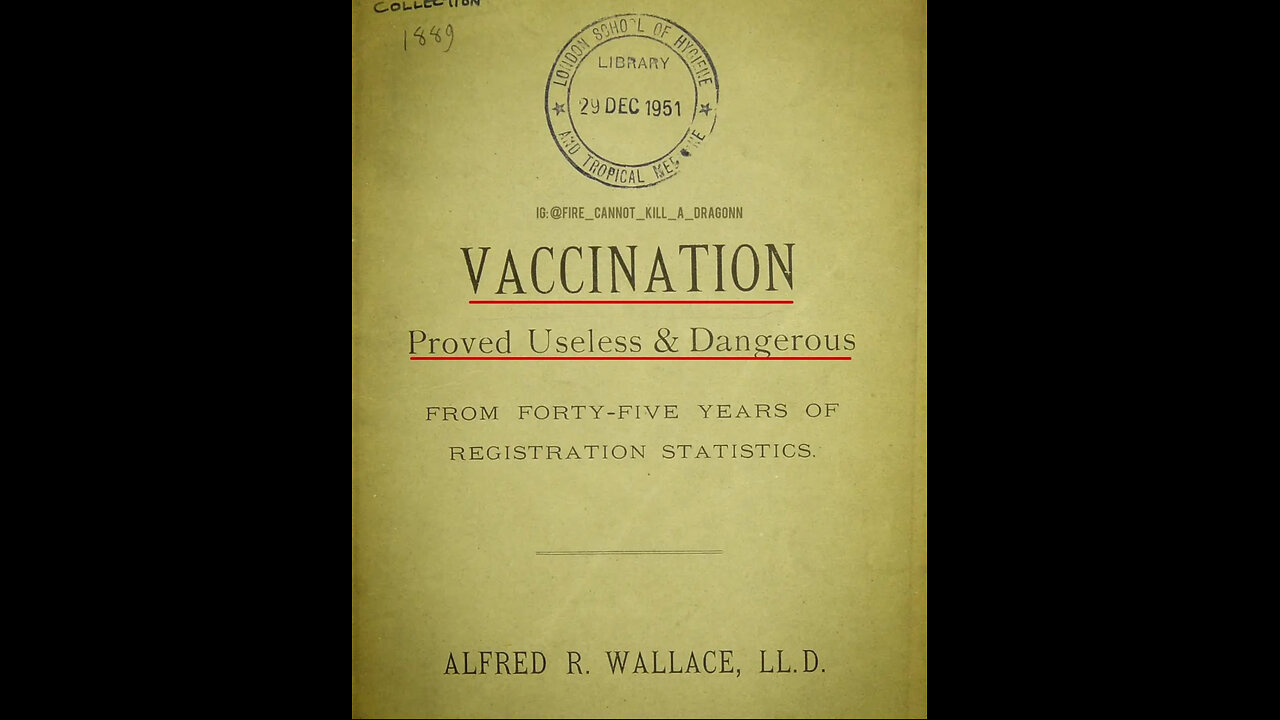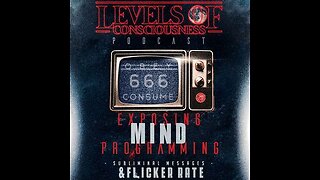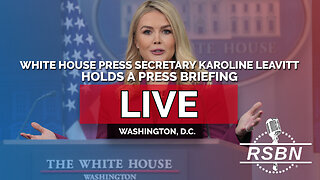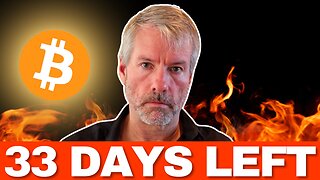Premium Only Content

Alfred Russel Wallace and the Critique of Vaccination: A Study in His Work and Perspectives
Introduction: Wallace’s Challenge to Medical Orthodoxy
Alfred Russel Wallace, renowned as one of the co-founders of the theory of natural selection, was not only a scientific mind but also a social reformer deeply critical of the institutions of his time. In his publication, “Vaccination: Proved Useless & Dangerous From Forty-Five Years of Registration Statistics,” Wallace turned his sharp analytical eye toward the practice of vaccination, particularly smallpox vaccination, which had become widely implemented and increasingly compulsory during the 19th century.
Wallace’s critique of vaccination was not rooted in opposition to science itself but in his commitment to evidence, transparency, and individual rights. His work delves into statistical analysis, the misuse of medical authority, and the broader societal implications of mandating medical interventions. This article focuses on Wallace’s arguments, examining his perspectives and the data he presented to challenge the prevailing views of his time.
1. The Foundations of Wallace’s Argument
Wallace approached the vaccination debate with the same analytical rigor he applied to his scientific endeavors. His critiques were built on three central pillars:
1. Statistical Evidence of Ineffectiveness
• Wallace meticulously analyzed 45 years of smallpox mortality statistics in England and Wales. He concluded that vaccination had not significantly reduced the death rate from smallpox.
• He argued that any apparent declines in mortality were better attributed to improved living conditions, sanitation, and nutrition rather than the effects of vaccination.
2. The Dangers of Vaccination
• Wallace highlighted numerous instances of adverse effects and deaths following vaccination, pointing to contamination, poor administration practices, and the lack of consistent oversight.
• He questioned the ethics of subjecting individuals, particularly children, to a medical procedure with documented risks and unproven benefits.
3. Mistrust of Medical Institutions
• Wallace believed that the medical establishment of his time often acted in its own interest rather than prioritizing public welfare. He accused public health officials of manipulating statistics to promote vaccination, ignoring data that contradicted their narrative.
2. Wallace’s Critique of Compulsory Vaccination
Wallace was a staunch opponent of compulsory vaccination laws, which he viewed as an infringement on individual liberty and bodily autonomy. His arguments against compulsion were both ethical and empirical:
1. The Ethical Dilemma
• Wallace argued that mandating vaccination violated personal freedoms, particularly when the evidence supporting its effectiveness was questionable.
• He believed that individuals should have the right to make informed decisions about medical interventions, free from coercion or state-imposed penalties.
2. The Tyranny of Medical Authority
• Wallace was deeply critical of the power wielded by the medical establishment, which he felt was often unaccountable to the public. He warned that compulsory vaccination set a dangerous precedent for unchecked state control over personal health choices.
3. The Role of Sanitation and Living Conditions
One of Wallace’s central contentions was that the decline in smallpox mortality observed during the 19th century was primarily due to improvements in public health infrastructure rather than vaccination. He emphasized:
• Hygiene and Sanitation: Wallace pointed to the role of better waste management, clean water supply, and urban sanitation in reducing the spread of infectious diseases.
• Nutrition and Living Standards: He argued that improved access to nutritious food and better living conditions strengthened individuals’ natural immunity, making them less susceptible to severe illnesses.
Wallace believed that addressing these root causes was a far more effective and ethical approach to public health than mass vaccination campaigns.
4. Misrepresentation of Data
Wallace devoted significant effort to exposing what he saw as the deliberate misrepresentation of data by proponents of vaccination:
1. Selective Use of Statistics
• Wallace accused public health officials of cherry-picking data to support their narrative while ignoring instances where vaccination appeared ineffective or harmful.
2. Correlation vs. Causation
• He argued that vaccination proponents conflated correlation with causation, attributing declines in smallpox mortality solely to vaccination without considering other contributing factors.
3. Independent Analysis
• Wallace called for independent, unbiased analysis of public health data, free from the influence of vested interests in the medical establishment.
5. The Broader Implications of Wallace’s Work
Wallace’s critique of vaccination was not merely a commentary on medical practices but a broader reflection on societal governance and the relationship between individuals and institutions:
1. The Dangers of Blind Trust in Authority
• Wallace warned against unquestioning acceptance of authority, particularly when it came to matters of health and personal autonomy. He believed that the public had a duty to critically examine the actions and motivations of those in power.
2. The Importance of Evidence-Based Policy
• Wallace’s emphasis on statistical analysis and empirical evidence highlights the importance of basing public health policies on robust, transparent data rather than dogma or institutional interests.
3. The Right to Bodily Autonomy
• At its core, Wallace’s argument was about the sanctity of individual choice. He believed that no government or institution should have the power to impose medical procedures on its citizens without their informed consent.
6. Relevance Today
While Wallace’s work was rooted in the context of 19th-century England, his arguments remain relevant in modern discussions about vaccination and public health:
1. Ongoing Debates Over Vaccine Safety and Efficacy
• Wallace’s critiques echo in contemporary debates over vaccine mandates, adverse effects, and the transparency of pharmaceutical companies and regulatory bodies.
2. Balancing Public Health and Individual Rights
• The tension between collective welfare and personal freedom that Wallace identified continues to shape discussions about public health policy.
3. The Need for Vigilance
• Wallace’s work serves as a reminder of the importance of questioning authority and demanding accountability, particularly in matters that impact individual health and well-being.
Conclusion: Wallace’s Enduring Legacy
Alfred Russel Wallace’s “Vaccination: Proved Useless & Dangerous” stands as a testament to his commitment to evidence, critical thinking, and individual liberty. While his views on vaccination were controversial, they reflect a broader skepticism of unchecked authority and a deep concern for the ethical implications of public health policies.
By challenging the prevailing wisdom of his time, Wallace sparked important debates about the role of science, the responsibilities of medical institutions, and the rights of individuals. His work remains a valuable reminder that the pursuit of truth often requires questioning even the most deeply entrenched beliefs and practices.
-
 2:48
2:48
FragmentsOfTruth
4 days agoTHE INVISIBLE FRAME: A CONSPIRACY OF LIGHT
312 -
 LIVE
LIVE
Barry Cunningham
5 hours agoBREAKING NEWS: KAROLINE LEAVITT HOLDS WHITE HOUSE PRESS CONFERENCE (AND MORE NEWS)
3,037 watching -
 LIVE
LIVE
Major League Fishing
6 days agoLIVE! - Fishing Clash Team Series: Challenge Cup - Day 5
332 watching -
 2:53:12
2:53:12
Right Side Broadcasting Network
6 hours agoLIVE REPLAY: White House Press Secretary Karoline Leavitt Holds a Press Briefing - 8/28/25
84.4K35 -
 1:38:09
1:38:09
Simply Bitcoin
3 hours ago $0.97 earnedIs This Your LAST Chance to Buy Bitcoin Before the GENERATIONAL Bull Run Begins? | EP 1320
6.46K -
 LIVE
LIVE
StoneMountain64
1 hour ago#1 WARZONE TACTICIAN + New Battlefield Trailer
168 watching -
 20:03
20:03
Adam Does Movies
2 hours agoAlien: Earth Episode 1 - Recrap
47 -
 15:38
15:38
IsaacButterfield
10 hours ago $0.12 earnedExploiting His Baby For Views (The Island Boys)
9387 -
 32:09
32:09
The Boomer Effect
6 hours agoBuy American and Build America
3 -
 1:59:46
1:59:46
The Charlie Kirk Show
3 hours agoShould Taylor Swift Submit? + What's Wrong In Minneapolis? + MAHA vs. CDC | 8.28.2025
43.9K19